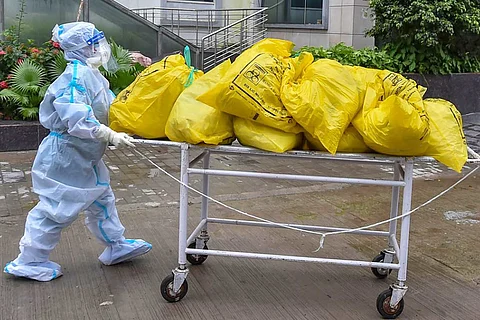

A report by TNM on May 19 found that several household units in Chennai, which have COVID-19 patients, have been disposing of their waste, including masks, PPE kits and medical waste, by mixing it with the general (municipal) waste. This prevents waste such as used masks, tissues and gauze with blood or bodily fluids of patients, sanitiser bottles used by infected persons and so on from being treated scientifically. Mixing it with municipal waste also exposes conservancy workers to a greater risk of infection as they handle this unmarked waste.
By not disposing household COVID-19 waste safely, patients and caregivers are doing a grave injustice to those lower down the waste management chain i.e. civic workers and waste collectors in the informal sector who collect and segregate this waste. Over a 1,000 conservancy workers handling solid waste got COVID-19 in 2020 in Chennai possibly due to improper waste disposal, a labour union of the Greater Chennai Corporation (GCC) staff told TNM.
The Central Pollution Control Board or CPCB had on June 17, 2020, issued detailed guidelines for handling, treatment and disposal of waste generated during treatment, diagnosis and quarantine of COVID-19 patients.
It says that all biomedical waste from the houses of COVID-19 patients or suspected cases should be put in yellow bags provided by the Urban Local Bodies (UBLs). The waste collected and sealed in yellow bags is then incinerated at Common Biomedical Waste Management Facilities (CBWTFs).
Biomedical waste includes used masks, gloves, tissues or swabs containing blood/body fluids of patients, syringes, medicines, drain bags, urine bags, body fluid or blood soaked tissues/cotton, empty ampoules etc.
It does not include leftover food, food packaging, tetra packs and so on used by patients or suspected cases. As per the Pollution Control Board guidelines, this can go as general waste (not in yellow bags).
However, some UBLs such as the Delhi Municipal Corporation and the Greater Chennai Corporation have asked for leftover food and water packets used by patients too to be dropped in the yellow bags to prevent any risk of infection.
Persons taking care of quarantine homes or COVID-19 homes should deposit their waste from suspected cases or COVID-19 patients in the following three ways:
The Greater Chennai Corporation employs conservancy workers who pick up COVID-19 waste from the doorstep of quarantine homes and COVID-19 homes. All that a patient or a caregiver needs to do is to segregate the COVID-19 waste and put them in the yellow bags.
If caregivers in quarantine homes or COVID-19 homes haven’t got the yellow bags, they should contact the UBLs (their respective zonal officers) and avail these bags. The details of the UBLs and other important contact numbers are usually provided by the Corporation when a person tests positive.
For bigger quarantine camps, the guidelines say that the camps should appoint a nodal officer who can register the camp on the Central Pollution Control Board’s biomedical waste tracking app called COVID19BWM (available on Google Playstore). They can update the details of waste generated daily on this app.
They must also call operators of the Common Biomedical Waste Disposal Facilities (CBWTF) to collect the waste as and when it gets generated. Contact details will be provided by the UBLs.
UBLs must create separate teams of workers to collect waste from COVID-19 houses and quarantine homes. These bodies must ensure that only the designated staff collects this waste.
The staff should be provided with personal protective equipment such as three layer masks, splash proof aprons/gowns, heavy duty gloves, gumboots and safety goggles which they should wear all the time while collecting waste from COVID-19 houses or quarantine homes. They should also be trained in sanitisation methods.
The local bodies can also use dedicated carts, trolleys, vehicles for transport of COVID-19 waste and general waste separately. These carts/vehicles should be sanitised with 1% sodium hypochlorite solution after each trip.
Before disposing of the bags, the bags containing general waste too should be sanitised with the sodium hypochlorite solution. Waste collectors arriving at quarantine centres or at home care may spray the disinfectant (1% sodium hypochlorite solution) on the solid waste bags and the bin used for yellow bags, as per the guidelines.
Lastly, the local bodies have to create awareness among citizens on how to properly segregate their COVID-19 waste.